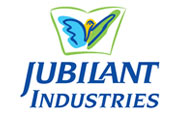Today, business is being constantly challenged on
sustainability issues like climate change, natural resource depletion,
stakeholder accountability, corporate governance etc. The need is to convert
these risks into opportunities and business is the driver to win over the
existing case. Business models have been redefined taking in account the
socio-economic development along with environment conservation of the world
at large.
Jubilant Industries Limited (JIL) strives towards sustainable business i.e.
business not just based on financial performance, but with a broader set of
development goals. JIL conducts its business in accordance with the concept
of “triple bottom line” focusing equally on economic, social and
environment aspects of sustainability.
JIL believes in manufacturing high quality products with minimum impact on
the environment and keeping in mind the requirement of valued customers.
While manufacturing products, we emphasize on resource conservation, quality
assurance, energy efficiently, reducing pollution and health & safety of
employees and community where we operate.
The Company believes in Inclusive growth i.e. growth of the key
stakeholders along with the Company and encourages transparency,
accountability and good governance practices across all facets of business.
The Company has adopted integrated policy on Environment, Health &
Safety and Sustainability Mission steering business towards long term
success.
The team at Corporate Level reviews monitors and provides guidance for
continual improvement of Environment, Health & Safety matters of the
company and reports to the Management on monthly basis. This team is
assisted by qualified professionals at each location/plants to maintain the
systems in the company. The company’s EHS performance is regularly
audited both through internal audits and Third party external audits, as per
need.
Resource Conservation
JIL is committed for the planned management of natural resources to
optimize the utilization, efficient usage, reuse, and recycling of
resources. JIL aims to use resources sustainably - more efficiently and with
minimum impact to the environment and human health. The Company’s
conservation strategy on usage of resources enables direct economical
benefits like direct cost savings and also benefits the environment by
reducing air emissions, effluent & waste minimization and mitigating
climate change.
The Company endeavours to minimise the energy consumed and wastes generated
at all production stages, from raw material procurement through the
lifecycle of the product right up to the final disposal.
Water
JIL understands business risks and opportunities relating to water scarcity
and is committed to promote responsible water management. We acknowledged
the fundamental need for more detailed work on water conservation,
efficiency and productivity. The strategy adopted by JIL is to use water
efficiently, recycle and reuse wherever possible, explore options where
water consumption can be reduced, use of latest technology to treat the
effluent and maintaining the status of zero effluent discharge.
For minimizing usage of water, various efforts such as mopping in place of
hosing for cleaning of floors, reusing low graded products for cleaning the
blending vessels & reactors of high graded products and regular
monitoring of water usage etc. are practiced in our plants.
Climate Change and Energy Conservation
Climate change poses a major threat to the business as well. Through
decisions to invest in researching and implementing new energy technology
and energy efficiency measures, business plays an important role in
mitigating climate change. JIL is committed to address the challenges of
climate change through deployment of energy efficient technologies, product
responsibility and sustainable use of resources
The Climate Change Mitigation Policy of JIL guide in setting up a roadmap
to address the risks and opportunities related to climate change.
Air Emissions
JIL considers clean air as an asset and continues to enhance the technology
and upgrade processes to reduce its impact on the quality of air. JIL has
installed adequate treatment facilities to ensure necessary compliance.
Regular monitoring of all stacks is being done by third party for the
concentration of pollutants being released into the atmosphere.
Effluent Management
Effluent management is on high priority for the Company to reduce its
ecological impact. We have been encouraging and following innovative and
efficient ways to reduce the effluent. A major achievement has been
production of Sodium Silico Flouride (SSF) from the waste scrubber water
used in the production process of fertilizer Single Super Phosphate (SSP).
At Samalaya Unit of the Company, the effluent after primary treatment is
sent to an authorized common effluent treatment facility. These are few
endeavors that clearly showcase effective and efficient effluent management
by the Company.
Waste Management
The company generates very low quantity of hazardous waste from its
operations and follows methodologies to reuse the waste generated in the
plants, for instance recovery of sulfur from sludge in the fertilizer plant
at Gajraula Unit of the Company. Reuse of Silica in SSP is another example
of waste utilization in the fertilizer plants at Gajraula & Kapasan. The
Hazardous waste that is not being treated / utilized at the Unit is sent to
the vendors authorized by the State Pollution Control Boards.
Safety
JIL’s approach adopted to handle various aspects of safety includes
- Identification of hazards and assessment of risk involved in various
activities carried out at product development stage as well as in the
plant.
- Comprehend and in-corporate necessary safety measures at the design
stage itself.
- Develop and implement effective systems such as work permits, mock
drills, system of reporting incidents, identifying the root cause of the
same and built in preventive measures etc.
- Fire being a major hazards in all its operations, an elaborate fire
fighting system is installed comprising alarm systems, manual call
points, sprinkler systems, pressurized fire hydrant system, fire tenders
and well trained human resource to handle emergencies
- ‘On site emergency’ plan which is updated regularly,
training imparted, mock drills organized to fine tune the emergency
plans.
- Carrying out HAZOP/ HAZAN studies, developing safety data sheets,
selection of suitable material of construction, developing standard
operating procedures, carrying out hazardous area classification are
some of the methods adopted to handle safety aspects of company’s
operations.
- Safety training is imparted to both employees as well as contract
workers regularly.
JIL’s approach towards safety management is based on the mix of Lag
and Lead indicators. In terms of Lag indicators, employees are involved in
reporting the near misses.
Occupational Health Approach
All employees as a part of their annual Health Checkups are examined.
During the examination they are counseled on communicable & non
communicable disease control, balanced diet, healthy heart & first aid.
If any deviation is noticed in their medical records, specialist advice is
sought & necessary treatment is given. An annual medical surveillance
plan of such employees is maintained & they are followed up with
necessary lifestyle modification measures, if required. In addition, we are
also carrying out identification of various factors adversely affecting
working environment and impacting the health of workers for necessary
corrective action.




